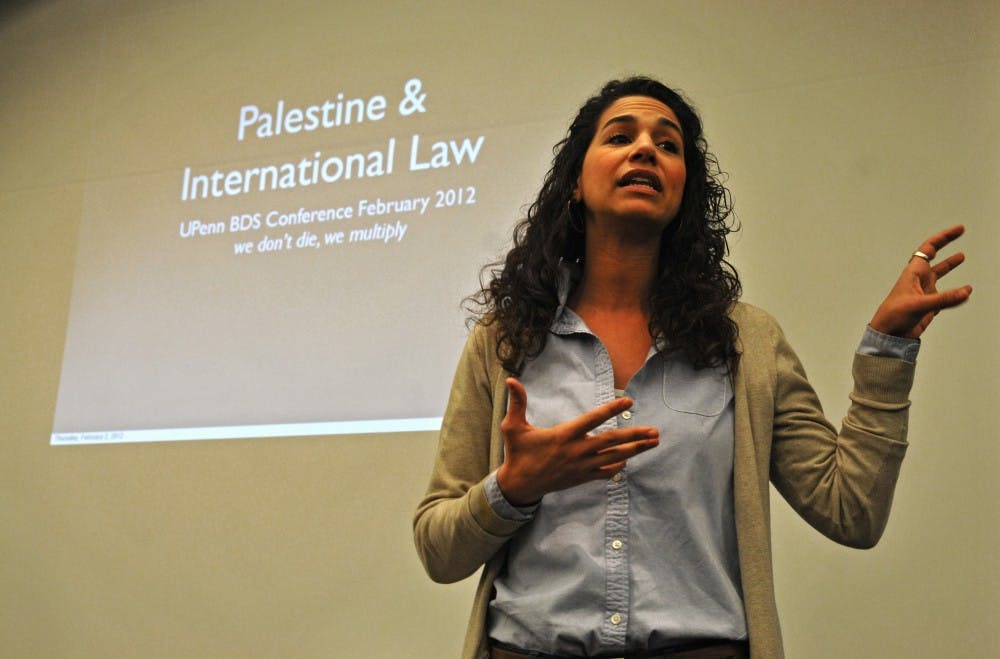
“[Academic boycott] may not be the most important issue to BDS,” Political Science and Comparative Literature professor Anne Norton said, “but it is an issue that strikes closest to home.”
Norton was one of three panelists at the Academic Boycott breakout session Saturday afternoon. It was among the series of events held on the second day of the National Boycott, Divestment and Sanctions Conference.
The panel speakers defined “academic boycott” with parameters outlined by the United States Campaign for the Academic and Cultural Boycott of Israel.
Norton’s presentation highlighted how American academic institutions tend to censor the Israeli-Palestinian conflict, often skewing perspectives in favor of Israelis.
“[Censorship practices] are not ordinary in American academies,” she said, “but only on this subject.”
She cited examples where American universities would “weed out anyone critical of Israel.”
“It’s not just about what you can say, it’s what you must say,” she added, explaining how many American professors are pressured to recognize the Israeli state in class, a form of censorship in itself.
“It is important to recognize the linkages between the different forms of subjugation,” Nikhil Singh, a New York University associate professor of Social and Cultural Analysis, said.
Singh outlined several examples where Israel would close Palestinian universities and restrict equipment imports for research.
Penn English professor Amy Kaplan also added that the military checkpoints and roadblocks between Israel and Palestinian territory makes it difficult for students to keep normal school schedules.
For example, she said a director of student activities would have to end extracurricular activities early in the afternoon because it takes students three hours to commute from school.
On exam days, students end up being late or miss exams even if they leave three hours earlier often because of lengthy protocols at security checkpoints, she said.
Kaplan emphasized her belief that boycott is “a means to an ends, not an ends to itself.”
“We want to end the de facto [Israeli] … boycott of the Palestinian education community,” she said, stressing that a boycott against Israeli institutions would be a protest of the current Israeli restrictions on Palestinian academic institutions, not a boycott for the sake of restricting academic freedom.
“Freedom of movement is fundamental to academic development,” she said.
Her presentation focused specifically on the mobility restrictions Israeli authorities place on Palestinian academic institutions and individuals.
“It may seem minor, but in context of academic freedom, it is hard to sustain an academic community in the face of such restrictions,” Kaplan said.
She called for academics around the world to make connections with Palestinian universities, which would “expand the boycott in a positive way.”
“I loved the speakers,” Barry Fruchter, an English and Jewish Studies assistant professor at New York’s Nassau Community College, said. “It’s important to move off the issue from being anti-anything to supporting the main goal of [Palestinian] academic freedom,” he said.
Elisha Baskin, a research associate at the Harvard Kennedy School of Government and graduate student at Brandeis University, agreed. “It’s not about limiting anyone’s freedom,” she said. “It’s about going against the restrictive practices on academic freedom that has already been happening.”
Advisory Board member and professor of American Studies and Anthropology at Wesleyan University J. Kehaulani Kauanui chaired the panel.
Complete coverage
Related
BDS keynote speaks on Palestinian’s struggle for equality
BDS conference opens with criticism of UN, Israel
State senator Anthony Williams addresses student leaders at Hillel
BDS conference arrives this weekend
Upcoming conference sparks debate
Students sign petition against BDS
Politic blog: The Red and the Blue
Dershowitz talk met with polarized online reaction
A flyer being distributed before the Dershowitz talk
Amy Gutmann’s remarks at the Dershowitz talk
The Daily Pennsylvanian is an independent, student-run newspaper. Please consider making a donation to support the coverage that shapes the University. Your generosity ensures a future of strong journalism at Penn.
DonatePlease note All comments are eligible for publication in The Daily Pennsylvanian.








